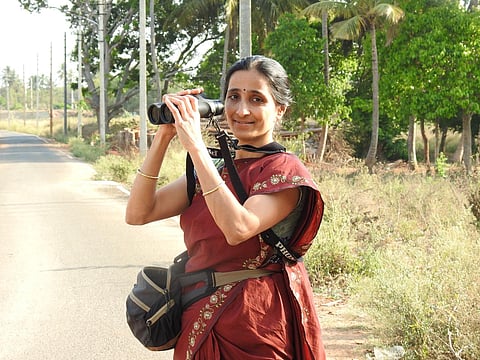

BENGALURU: It takes a different kind of imagination and empathy to see a world beyond us. Shubha Bhat, a nature lover-turned-birdwatcher can be seen as one of them. Her book, Pakshi Jala, which was recently released by the Indian Institute of Science (IISc) is an extensive photographic documentation of over 200 species of birds in and around the IISc Campus.
While talking about her journey of becoming a photographer, she says, “I didn’t want to become a photographer first of all but I was always very passionate about nature as a whole. When I was living on campus, I used to feel that I had all the facilities, but these birds and animals do not always have easy access to water and they also can’t ask for it.” This thought was the inception of Bhat’s birdbath initiative which started in 2009.
The book, which is an IISc Press Production, came to life due to continuous encouragement and support from Bhat’s friends and family. “I had never had an intention to write a book, it was just to learn about nature. I don’t come from a botany and biology background either. I can just give them my observations and experience nothing more than that,” shares Bhat.
Bhat recalls sighting and documentation of a rare Kashmir Flycatcher in Karnataka in 2013. “I was sure it was a different bird because I had never seen it before. I had to get help from my mentor and advisors to identify the bird. I wasn’t sure whether they would agree with me so I took videos and to my surprise, it was Kashmir Flycatcher, and they said it was a first record for Karnataka, and that too from my garden,” says Bhat.
While sharing her thought process behind the book’s name, Bhat says, “I like the word ‘Jala’ because it can have a lot of connotations. Jala is water, but it also means a web that reflects the symbiotic relationship that connects everything in nature, and it can also mean indrajala which is magic, and this is magic!”